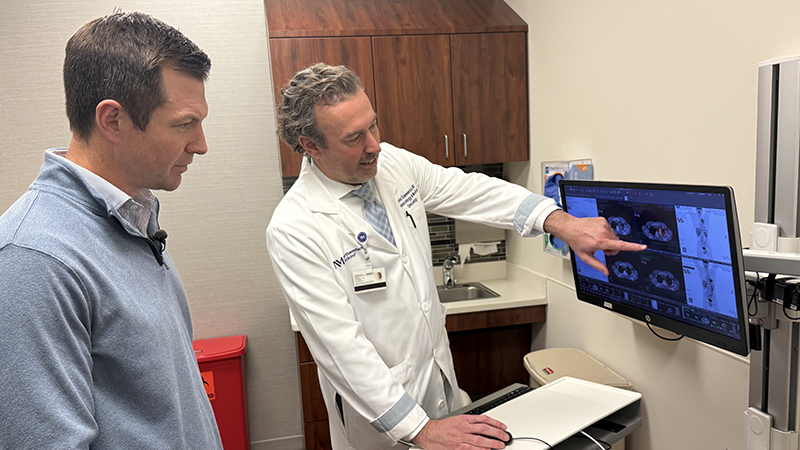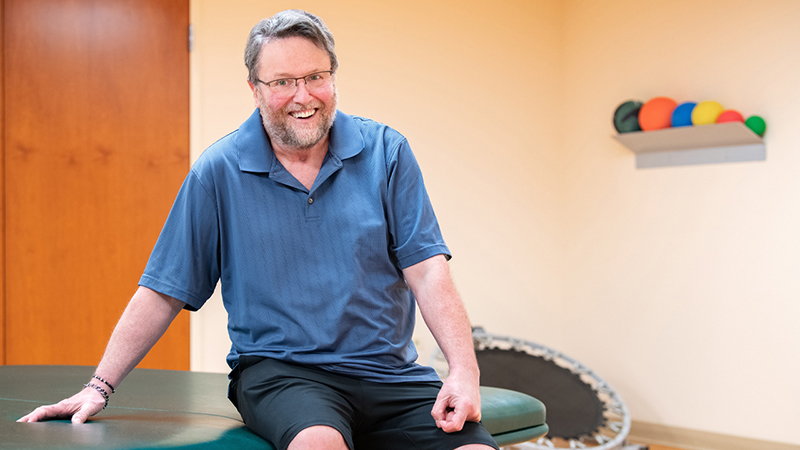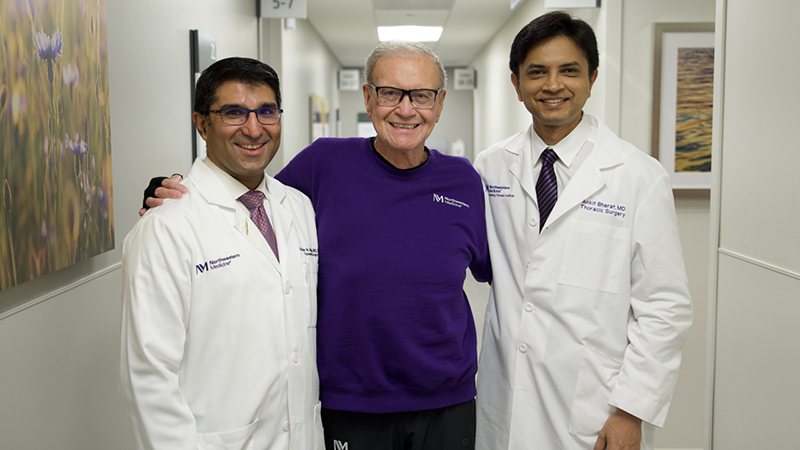A One-In-A-Million Case Requires Expert Care
An Extremely Rare Cyst Causes One Patient’s Brain to Swell
Updated March 2024
Just 24 hours after Leslie Fenton met Northwestern Medicine Neurosurgeon Stephen T. Magill, MD, PhD, she was taken to the operating room. Leslie had learned she had an extremely rare colloid cyst between the hemispheres of her brain, causing it to swell, and immediate surgery was her only option.
“Most people have about one-in-a-million chance of developing a colloid cyst,” says Dr. Magill. “They are so rare that, in training and in even in a busy brain tumor practice, you only see these kinds of cysts a few times a year.”
The Impact of a Colloid Cyst
Colloid cysts are slow-growing cysts that typically form in early development. While they are benign (non-cancerous), they can cause sudden death if they are left untreated.
You only see these kinds of cysts a few times a year.— Stephen T. Magill, MD, PhD
Adults produce roughly 600 milliliters (mL) of spinal fluid a day, about the same amount of liquid as two cans of soda. Spinal fluid nourishes and cushions the brain and spinal cord. At any given time, a brain floats in 150 mL of this spinal fluid, which circulates through the brain’s ventricular system three to four times per day.
Colloid cysts can block the brain’s spinal fluid circulation pathways. When these pathways get blocked, the cyst effectively creates a dam, and the trapped fluid builds up in the brain and pressure in the skull increases. The increased pressure causes the brain to stretch and swell, almost like a balloon.
“Some of the symptoms people might experience when they have a colloid cyst are trouble walking, headaches, blurry vision, confusion and sometimes memory problems,” Dr. Magill says.
Leslie’s Story
As the colloid cyst grew, it put pressure on Leslie’s brain, and she began experiencing significant motor and cognitive deficits. At 67 years old, Leslie had been happily married for more than 40 years and was an investment banker. She and her husband Mark enjoyed taking walks through their neighborhood in Hinsdale, Illinois.
Then, in the summer of 2023, Leslie’s gait became abnormal and she couldn’t walk without dragging her feet. Her work notes became almost unreadable, she was battling memory loss and confusion, and she even fainted at her desk in her home.
On July 24, Leslie’s primary care clinician suggested an MRI. The scan revealed a mass deep in her brain, close to the middle of her head. It was then that she sought treatment from Dr. Magill.
“The majority of patients with colloid cysts may never require surgery. In Leslie’s case, since fluid buildup was so great, we had to intervene,” says Dr. Magill. “Her cyst was located near the fornix, which is essential for memory and located very deep in the brain, so this surgery was considered high-risk.”
Dr. Magill and his team were able to perform a minimally invasive craniotomy, in which a part of the skull is temporarily removed to expose the brain and perform an intracranial procedure. While this procedure is relatively common, because of the location, severity and rarity of Leslie’s cyst, the surgery required a specialized team, a highly skilled surgeon and a careful approach.
Working through a 1-inch incision in the skull, Dr. Magill used a plastic tube to separate the folds of Leslie’s brain and place his instruments. Working under the operating microscope, this approach helps protect the fornix, the delicate area that controls memory formation.
After the cyst was removed, the pressure in Leslie’s brain decreased and her spinal fluid returned to normal. She left the hospital two days after surgery, already walking normally.
Two months after surgery, Leslie returned to work, and three months after surgery, the fluid in her brain remained at normal levels.
“Dr. Magill and his team are magical,” Leslie says. “Words can’t describe how grateful I am for their compassion and expertise. They saved my life. I’m looking forward to spending many, many more years with my husband, kids and grandchildren.”






